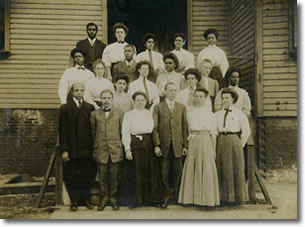School

As historian Crystal deGregory has chronicled, a few private schools created by and for African Americans and supported by those who could afford the tuition, existed in Tennessee before the Civil War. In and near federal military installations and in the early post-war period, groups such as the American Missionary Association and the Freedmen’s Bureau opened primary schools for both adults and children. Immediately following Emancipation, secondary schools with high standards and aspirations, such as Nashville’s Fisk University, Knoxville College, and LeMoyne College in Memphis, attracted students, some of them children of former slaves, from nearby states. Supported by private tuition and philanthropic patronage, these institutions taught the first generations of teachers, business and civic leaders, and those who went on to become medical and legal professionals in Tennessee.
Lesson Plan: Historically Black Colleges and Universities in Tennessee
Related Content
See more images of African American schools in the Southern Places collection.
I've Got a Place in Free Hill, recorded by Robert "Bud" Garrett. Full Item Record.